As I write this I am sitting in my PJ’s still recovering from the thanksgiving meal, watching my adorable toddler play with her cousin. I am thinking about how grateful and lucky I am to have a roof over my head, food to eat, and the ability to provide for my family. There are thousands of people and families in the Jersey City area who are not as fortunate, and will not have a place to go to during the holiday season and cold winter months. It is so heartbreaking but it’s a reality we need to be aware of and do what we can to give back to those in need.
Garden State Episcopal CDC is a non-profit organization that helps the less fortunate in Jersey City with affordable housing, social services, outreach to the homeless and much more. I sat down to speak with the staff of this amazing organization. They touched my heart, these people dedicate their lives to helping those in need and while hearing them speak about their love for their jobs I was in tears, they are so inspiring. They are true Jersey City angels.
Please read their story. It gives a lot of great information on the homelessness issues in Jersey City. Share it with your peers and donate what you can.
They need to raise money for a new heating system in their Union City shelter (which houses JC people) Https://www.gofundme.com/percwinterwarmth
They also have a wish list on amazon for items they need to give to those in need to stay warm during the winter season. http://www.amazon.com/gp/registry/wishlist/LTQF4FPKFP1R/ref=topnav_lists_1
What’s your name? My name is Sarah Fishtein.
What do you do? I’m a Communications Associate for PERC (Palisades Emergency Residence Corporation) Shelter and Garden State Episcopal CDC (Community Development Corporation).
Can you give me a little background about the organization? Garden State Episcopal CDC is a thirty-year old nonprofit, non-denominational organization, and its primary goal is to create healthy neighborhoods through various community development initiatives like affordable housing construction, social services, supportive housing and outreach to the homeless community.
According to the most recent Point-in-Time Count–which is a federally funded count that happens across the nation to count homeless individuals – there were about 1000 homeless individuals counted in Hudson County. The problem with the count is that you’re only counting who’s on the street that night and it’s generally understood that it undercounts the number of homeless individuals. So to get a really accurate look, it’s really difficult to track the numbers at any given time because there are people sleeping on people’s couches, families may be in a motel for the night, etc. In Hudson County, we think that the number may actually be closer to 2000, and the really alarming thing that’s happening right now that we’re seeing is a big increase in not just individuals, but homeless families with young children. From last quarter to this quarter there’s been a 195% increase in homeless families who are coming to our main office needing services.
Why do you think that’s happening? Locally, we have a perfect storm of lack of affordable housing stock, rising rents, and a loss of reasonably paid manufacturing and other blue-collar jobs. The cost of living is soaring, but most job wages have remained fixed. Remember that minimum wage in NJ is still only 8.38 an hour. Even when someone’s working full time – which is not always possible when hours are cut back – their income is hardly breaking a thousand dollars a month. Add kids, living expenses, medical costs, etc. How many apartments in the area do you know of that rent for less than a thousand dollars a month?
With the current preponderance of high-end real estate development, there’s a domino effect in which rents go up for everybody and families who were previously maybe just getting by with their rent, all it takes is a little increase and it’s very easy to fall behind in payments.
Unfortunately there is precious little infrastructure in the area for families who are homeless. Our sister shelter, PERC in Union City, has one family unit where a family can stay for 120 days to get back on their feet, but the rest of our beds are for single adults. There’s really only one emergency shelter within Hudson County that accommodates families—Hope House in Jersey City—and they are almost always full.
Let’s say a family calls and says, “We have nowhere to be,” what do you guys do for them? First thing is that we invite the clients to come in for an intake so we can properly assess their needs and make referrals as necessary. If possible, we refer them to Hope House. We also refer them to The Hudson County Homeless Hotline – the County will provide one night in a motel if you’re a family with children under the age of 18 But the next day you’re in the same place. At GSECDC, we do have some limited funding that may be able to help pay back rent to prevent eviction or pay first month’s rent and security for a new apartment going forward – these are our Homelessness Prevention and Rapid Rehousing programs – but that is not an instantaneous process. In essence, for a family that is homeless, the immediate reality is very troubling.
Can you tell me more about your role here? Like all nonprofit folks, I’m a jack of all trades. I’m based out of our emergency overnight shelter, PERC (Palisades Emergency Residence Corporation). In 2013, Garden State Episcopal merged with PERC, so now they’re sister organizations. PERC is on 37th Street in Union City and I help with general operations and functions from day-to-day – building maintenance, community relations, etc. There are 40 shelter beds plus overflow space, 8 residential supportive housing units, one family unit, and there’s a soup kitchen that serves 100 people a night. That’s a community meal, anybody can come to that and also there’s a food pantry that happens once a week. I also coordinate the food pantry deliveries and I coordinate volunteers, groups and collection drives. I also manage the social media, and I am desperately trying to lavish some care on our website, which needs a lot of TLC.
What made you start volunteering here? When I moved to Jersey City nine years ago, I became very attuned to the class divisions around me. Coming from a reasonably privileged and educated background, it felt important for me to consider my role as a gentrifier in Jersey City and what the presence of people like me would mean for the entrenched community. A couple of years ago, I volunteered for the Point-in-Time Count in January. By the end of a day spent in the office sorting clothing donations, I had kind of fallen in love with the GSECDC staff, the clients, and the thoughtfulness of the programming. I just noticed a great sense of harmony here and people who are really committed to this work. It is just a really well functioning organism and I was and continue to be really impressed by the work that goes on here.
Can you tell me more about where we are today? Yeah, we’re at the home base for Garden State Episcopal and there are a range of programs that happen here, the one you notice when you first walk in is that we have a drop-in center which is open five days a week, Monday through Friday from 9AM to 4PM and the idea behind that is that most homeless shelters close in the morning so they’re closed during the day. So if you’re out of work and you don’t have anywhere to go especially if it’s cold out or when it’s hot in the summer this is a space for people to come in and be off the streets. Here we distribute toiletries, socks, underwear and other necessities. We have computers, people can do resume work, job searching, we have snacks and coffee, there is a free nurse and a barber, there’s a specialist who works specifically with homeless vets, and most importantly there’s access to case managers here, which is how people are going to get set up to get permanent housing, ‘cause that’s our goal with everybody, permanent housing.
We also have other amazing programs like RIST (Residential Intensive Support Team) which provides rent-subsidized housing to people with mental illness or substance abuse histories who may be more susceptible to becoming homeless. The clients are matched with case managers who provide guidance and support and promote self-sufficiency as they navigate living in their own apartments. Likewise, we have 36 units of supportive housing for individuals and families living with HIV/AIDS.
Can you talk about your upcoming event, the Interfaith Homeless Memorial, as well as the Winter Warmth Campaign?
The Winter Solstice, which is the longest night of the year, occurs in late December, and for us it has become a time of commemoration of people who are homeless and of those who have died on the street. For the past six years, GSECDC has partnered with local organizations and the faith-based community to host this special event. There is a memorial service, and afterward we serve a hot meal to homeless guests and distribute warm items like jackets, hats, gloves, scarves, thermals and blankets. This year’s memorial will take place on December 17th at Old Bergen Church in Jersey City. We’re looking for people to donate warm items for this event, plus volunteers to help serve the meal, clean up, sort and distribute items.
The Winter Warmth campaign is also about gathering as many warm items as possible for distribution throughout the winter, and specifically, we have an immediate need for people to chip in towards the repair of the heating unit at PERC. We just learned that the HVAC system needs major repairs, and our contractor has discounted his price as much as possible for us, but it’s still in the range of several thousand dollars. We have a gofundme campaign up and running where people can contribute online. (https://www.gofundme.com/percwinterwarmth)
What’s your name and what do you do?
Hi, I’m Susan Milan; I’m the Director of Supportive Housing and Social Service Programs for GSECDC. I’m responsible for program development and oversight of all of our program operations, ensuring that we always keep our mission to serve those most vulnerable in the forefront of everything we do.
Joanne Smith, program associate. I work a lot on the HUD (Housing and Urban Development), management of the homeless information database which is a requirement of our funding sources. So I do data quality and forms and some administrative stuff, I volunteer at the front desk sometimes.
Hi! I’m Flora Cifelli, RIST (Residential Intensive Support Team) program. The RIST program, we provide permanent housing for people who struggle with severe mental illness and homelessness.
I’m Joe Ulicki, my official title is supervisor, but I do everything that’s needed be it in the kitchen, empty the garbage, counsel people when available, and direct people in the right direction, among other things.
I’m Michael Bacon, I am kind of the chargé d’affaires for the Drop-In Center.
Does somebody want to talk about all the programs?
Susan: So what we have here at this location the Hudson CASA (Creating Alliances to Shelter All) Coordinated Entry Program which is basically the first stop for people facing homelessness to come in and receive comprehensive assessment and case management services. We have a drop-in center where people can come to spend the day when they have nowhere to go.
They can get snacks and coffee, use computers; we have a nurse, offer haircuts, help with resumes, and we provide critical items such as toiletries and warm weather gear to the homeless consumers who need them. This is basically a place where people who are homeless can come and receive the services that they need. The most important of which being that they can get case management to stabilize their housing, first linkage with emergency shelter such as PERC, St. Lucy’s and then the development of a plan with their case manager to access other permanent housing options that may be available in the community. We also have Corpus Christi Ministries Housing which is a supportive housing program for individuals and families with special needs; we have the RIST program that Flora mentioned, supportive housing for those with severe mental illness, as well as various permanent supportive housing programs for the chronically homeless. We also provide rapid rehousing and homeless prevention services.
In November 2014, GSECDC started Hudson County’s first Street Outreach Team, designed to engage and assist those homeless who are labeled the hardest to serve. Since we started, we have assisted over 500 homeless consumers.
We work closely with the City of Jersey City and the Hudson County Administration to address the problems related to homelessness. We are an active member of the Hudson County Alliance to End Homelessness and are grateful to partner with so many agencies committed to improving quality of life and the circumstances of the homeless.
Flora: Supportive housing, the idea is that it’s a combination of affordable housing because it’s subsidized and a very heavy compliment of case management and supportive services and linkages with programming right in their housing. There are people who wouldn’t thrive without that level of support.
Susan: So that you’re not just taking a homeless person and putting them into an apartment-we also build the services around to help them keep the apartment. It’s an ongoing process to keep our consumers healthy and housed.
And where do you guys get all of your funding?
Susan: We have a diverse variety of funding sources; a large chunk of it comes from HUD, we get funding from HOPWA (Housing Opportunities for Persons with AIDS), the State of New Jersey Division of Mental Health and Addiction Services (DMHAS) , we received funding from the City of Jersey City, County of Hudson, and we’ve received some foundation grants. It’s a large mix of funding sources.
Can you tell me what a typical day is like?
Joe: A typical day normally, I get here about a quarter to eight and [I’m] preparing our light snacks for breakfast. We always make fresh coffee, big sixty-pound pot; we always have bread available with jelly, cake. See the shelters, they close around 8 o’clock and everybody has to leave, so we provide a safe haven for folks.
How did you get into it?
Joe: A long time, I started after college. I worked in a program in Newark called Renaissance House, it was for teenagers who were gonna be put away in jail and this was like their last chance. And then from there I moved on I worked in the jail system, social worker, and then I worked on case manager with folks with HIV. I just had, I don’t know why, but a desire to work with people and then god brought me here because I was working at St. Lucy’s for fourteen years and it didn’t work out at the end. So I was out of work, looking for work and I got a call, “Joe would you like to fill-in for a week?” there was an opening, a person had gone out on sick leave and they were supposedly coming back in a week. They didn’t come back and a week turned into a month and two and three and then I was offered a full-time position. And it’s blessing, I enjoy the work. There’s bad days but, there’s a lot of good days and we do a lot of a good here. You build trust with folks, they count on you, and you’ve gotta be strict sometimes.
It must be a hard job.
Joe: It is. It could be very frustrating and you do your best with what you have. And it’s frustrating in a sense when you get a call from someone or they walk in the door and say, “Oh my boyfriend threw me out. I have children, where am I going tonight?” and you do your best to get them into a shelter, maybe the homeless hotline and get them connected to case management, but you have to try not to take it home and if you take it home, there’s days where you can be very upset. Overall we do a lot of good here, concrete like Susan had mentioned with the rental assistance program and rapid rehousing. We help people [who] stay in the shelter and get a minimum wage job, but they can’t save enough to pay security. We’ll pay, if available, their securities and their first month’s rent. So we’ll do our best to accommodate folks.
How do you feel Jersey City has changed in the past couple years as it relates to your current business?
Michael: It’s changing and the explosion of construction of new rental and other housing units has a citywide effect with all the housing rents going up. So I think we’re on the cusp of even greater surge, we have an avalanche right now of calls from families who are homeless, much more than we did last year at this time.
Joanne: At least two to three households with children or families a day are coming to us, and the resources are so incredibly strapped. Every single day the case managers are struggling because there’s just not enough emergency shelter capacity.
Why do you think you’re hearing from so many families?
Joanne: More evictions, I think, is a big part of it, more rents going up and money not going up.
Flora: There is just not enough affordable housing in Hudson County. Families even working more than one minimum wage job they just can’t support rent the rent for a one or two bedroom if they have children. There’s a lot of evictions. People can’t keep up.
Michael: See, there’s an important distinction in terms of affordable housing. Lawmakers think that affordable housing is for people who make maybe around $45,000 a year; those are poor people to them. We deal with people who make $10,000 a year and there’s nothing for them anymore in Jersey City.
Flora: And $140 a month.
Joe: And I think a big part of the problem is that Jersey City lost so many manufacturing jobs. Years ago you had Colgate, Clorox, you had American Can Company, Dixon Pencil, you had major companies that relocated out and they were good paying jobs with minimal educational requirements and they lost all of those. And these were people who were blue-collar workers that could support their families, they’re gone.
Joanne: And another example is an individual who has been on public assistance that has timed out after five years. Yes, of course everybody says, “Get a job,” but the longer you’re out of work the harder it is because it’s still a buyer’s market. Employers are gonna choose somebody who has been working more because they feel they have more experience, so breaking in is not as easy as it sounds.
So obviously this is a major problem. Now the thing is we obviously can’t stop Jersey City from changing and developing, what can we do as individuals to help these people?
Michael: If people in town make it known that the scarcity of affordable housing stock and resources are unacceptable, that would be helpful. Communicate with your elected officials. I live in Journal Square and I’m seeing a massive change there, very aggressive tactics there. You know eventually it’ll be this very pristine place and where will people go? I mean, I don’t particularly like to see people out in the street either, but until some alternatives really do come along like housing for very poor people, that’s what I recommend.
Joanne: There aren’t enough resources to meet the demands of the homeless community. We rely very heavily on the help of volunteers. It really can have a very huge impact on the people we see to be able to give somebody a coat or to be able to give somebody a clean pair of socks or underwear, sneakers, I mean those things have a tremendous impact on that person’s life.
Sarah: We’re really in need of people who will help us out by hosting collection drives and fundraisers. A group of NJCU students just finished up hosting a “Socktober” drive for us and were able to collect lots of socks and underwear for us. A team from the Scholastic’s corporate office just dropped off 75 bath towels at the shelter. These kinds of donations have a direct, immediate impact. We can distribute items to our clients, and that’s one less expense for us. We have most of our needs posted on our Amazon wishlist (under PERC Shelter).
We also need a lot of help from people who can support us in bringing GSECDC and PERC to a more modern facing place in terms of how we engage with the public. Volunteers with experience in photography, web design and social media campaigns are most welcome. I’d like to bring in artists too. That’s my pet project, if we can marry people who have art backgrounds with some of the issues and campaigns we’re trying to promote.
Both GSECDC and PERC are always looking for administrative volunteers to spend a few hours in the week in the office answering phones, directing people to resources, and generally getting creative about how to support the work of our staff. (This was my own humble beginning at GSECDC!)
Joe: If there’s a major building large enough to accommodate a comprehensive homeless center which will assess people, provide basic needs. I believe in that that’s what we need like the old Murdoch Hall that’s closed down would’ve been perfect.
How many volunteers do you guys currently have?
Joanne: At any given time we have about 40, 50, 60.
One last question, what are all of your favorite Jersey City hangout spots?
Michael: Shoot, a lot of them are closed. Probably now it’s the WORD.
Joanne: It’s not really a hangout, but it’s my favorite spot, Liberty State Park.
Joe: Weekends I’m at Grundy Park, I crab and fish.
Flora: Well, Leonard Gordon Park is right by me.
Sarah: Café Saigon on Newark. It’s a little kitschy, and it’s always consistently delicious.
Susan: My favorite places are Wild Fusion, Ibby’s Falafel and the Van Vorst Farmers Market.
Any last words?
Michael: If you’re passing a homeless person, in some way, try not to reject or be hateful towards that person. Even if they’re a little odoriferous or they’ve been laying there for a long time, any kind of respect that’s shown is actually a very good thing.
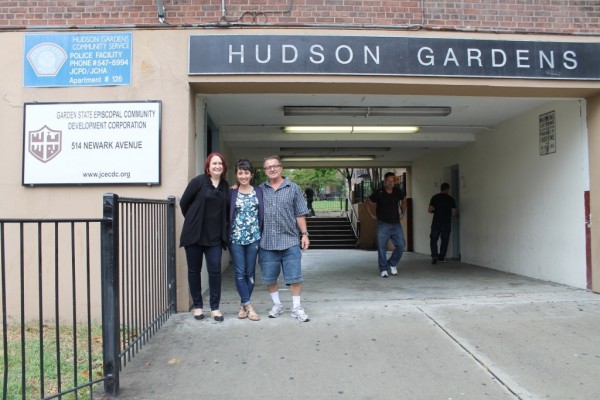
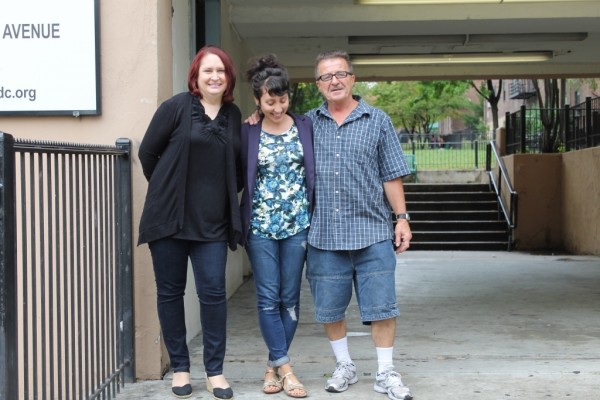
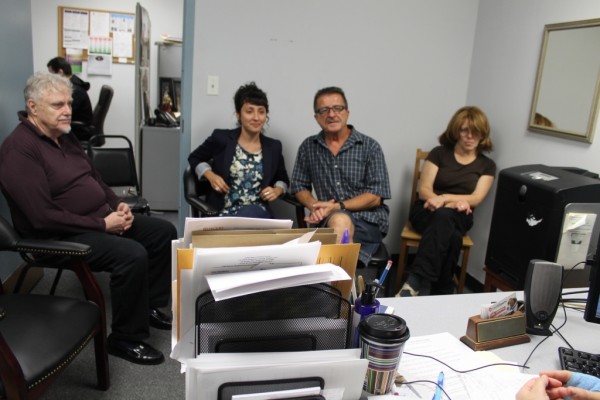
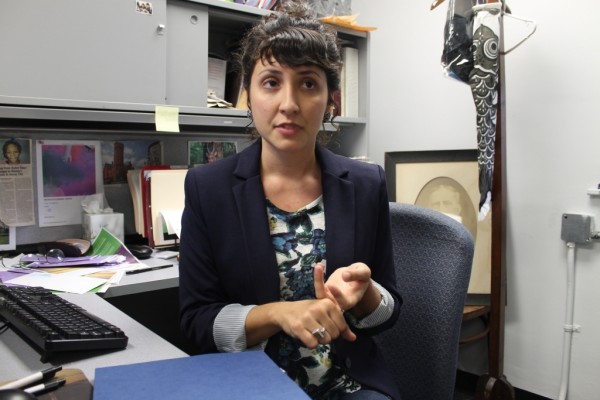
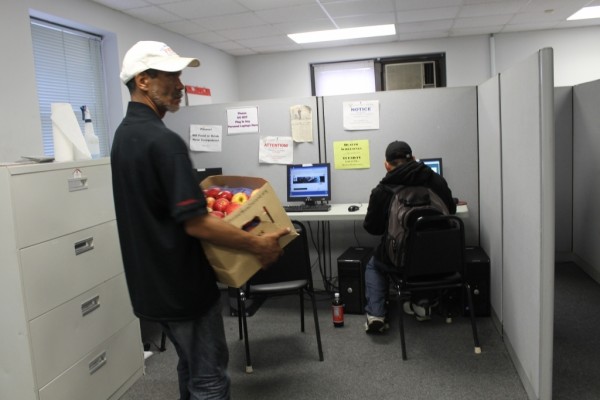

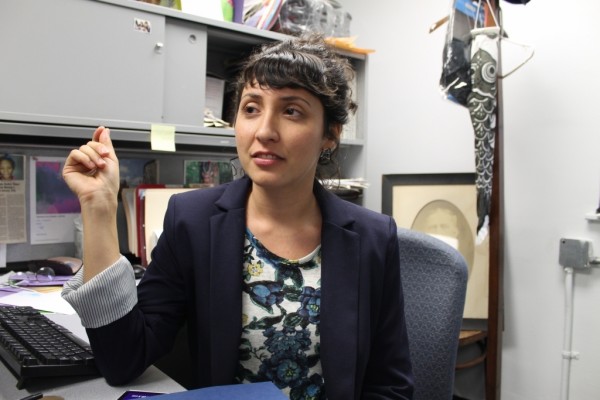
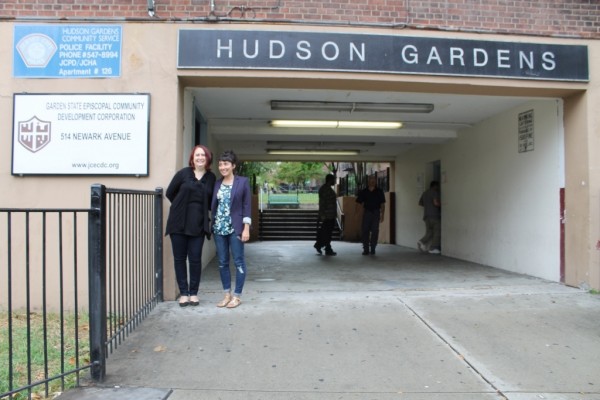
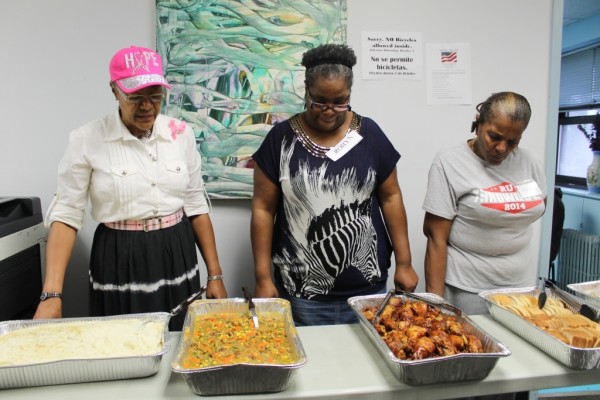
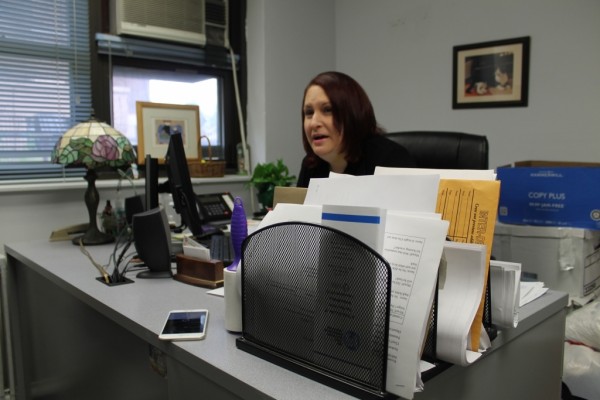
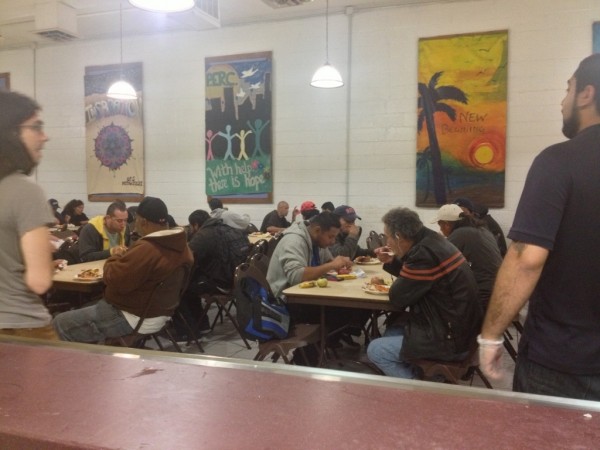
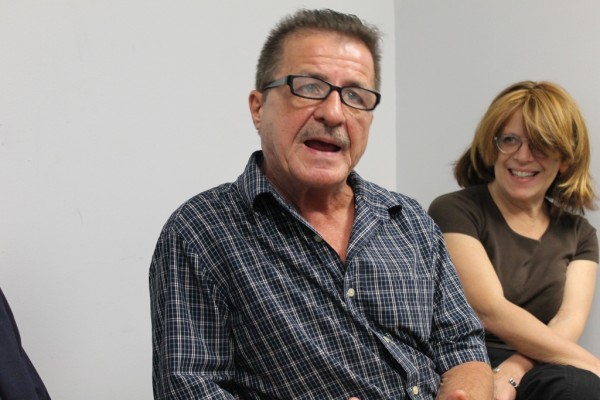
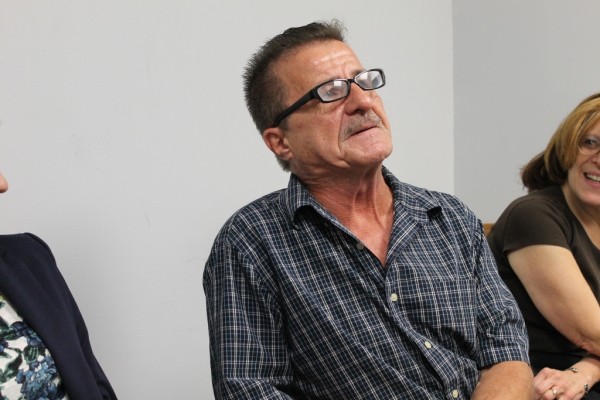
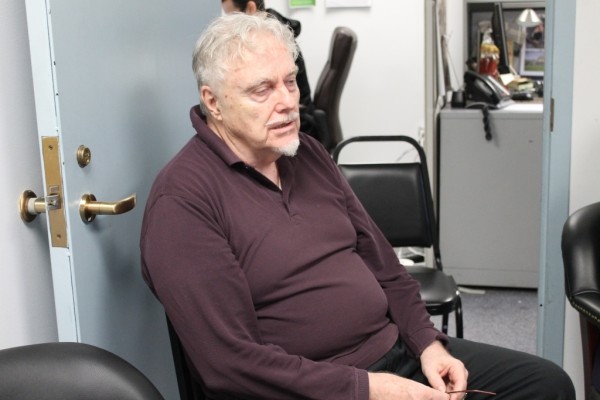
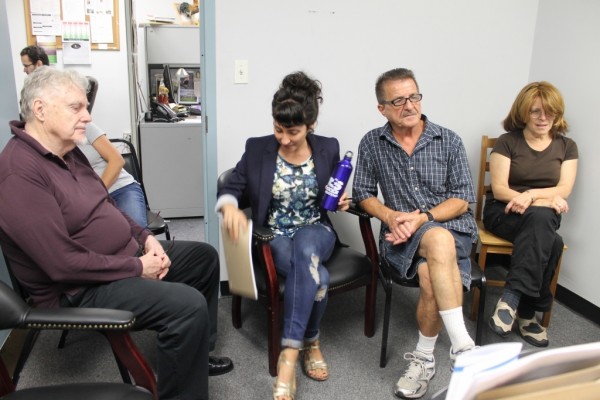
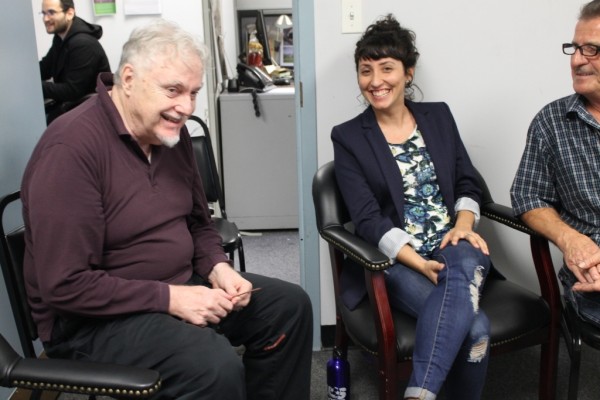
You must be logged in to post a comment.